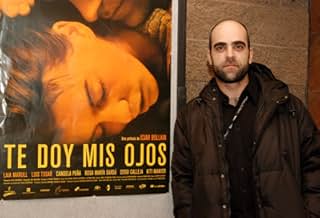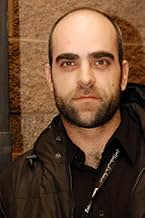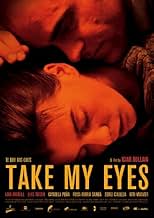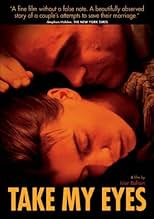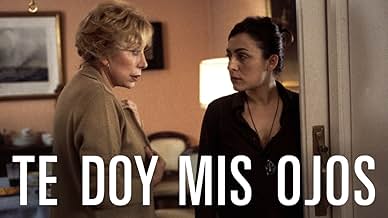IMDb RATING
7.4/10
7.7K
YOUR RATING
One winter night, Pilar runs away from home. With her, she takes only a few belongings and her son, Juan. Antonio soon sets out to look for her. He says Pilar is his sunshine, and what's mor... Read allOne winter night, Pilar runs away from home. With her, she takes only a few belongings and her son, Juan. Antonio soon sets out to look for her. He says Pilar is his sunshine, and what's more, "She gave him her eyes"...One winter night, Pilar runs away from home. With her, she takes only a few belongings and her son, Juan. Antonio soon sets out to look for her. He says Pilar is his sunshine, and what's more, "She gave him her eyes"...
- Awards
- 42 wins & 17 nominations total
Rosa Maria Sardà
- Aurora
- (as Rosa María Sardá)
Kiti Mánver
- Rosa
- (as Kiti Manver)
David Mooney
- John
- (as Dave Mooney)
- Director
- Writers
- All cast & crew
- Production, box office & more at IMDbPro
Featured reviews
From beginning to end this movie is a sea of tension, mostly generated by Pilar's (Laia Marull) stunning fear gestures, and by Antonio's (Luis Tosar) volatile state, leaving the spectators breathing heavily in awe.
With great performances by the entire cast, a solid and incredibly realistic script, an amazing score, and shot in the beautiful town of Toledo, this production grabs you right from the start. Even when the story isn't as disturbing as 'Once Were Warriors (1994)' the characters develop a three dimensional presence to the point of being as complex as a real couple in a self-destructive relationship creating such a drama, that tends to be more psychological than physical.
And even when the conclusion does not represent a drastic overcome, it stands as an example of courage and self determination that will, in deed, prevail in the mind of the viewer, and even more in those who find themselves in the same situation as the protagonist. Kudos to Miss Bollain, this is a good movie, be sure not to miss it.
With great performances by the entire cast, a solid and incredibly realistic script, an amazing score, and shot in the beautiful town of Toledo, this production grabs you right from the start. Even when the story isn't as disturbing as 'Once Were Warriors (1994)' the characters develop a three dimensional presence to the point of being as complex as a real couple in a self-destructive relationship creating such a drama, that tends to be more psychological than physical.
And even when the conclusion does not represent a drastic overcome, it stands as an example of courage and self determination that will, in deed, prevail in the mind of the viewer, and even more in those who find themselves in the same situation as the protagonist. Kudos to Miss Bollain, this is a good movie, be sure not to miss it.
This movie takes a brutally honest approach at the tragic reality of spousal abuse. This topic has been addressed before, but this movie deals with the subject matter better than any other I can recall seeing.
An effective performance by Luis Tosar, as the abusive husband Antonio, develops the layers of emotions in this imposing and frightening character in an effort to understand why this violence is occurring. While certainly not presenting an advocate's position to defend his cruel and vicious behavior, the film also resists the temptation of exploiting the volatile outbreaks. The film shows degrading speech and physical battery to the wife, while not going overboard with bloody, gory attack just for their own sake. He attends support groups to discuss with a psychologist and other abusers the root causes of the action, and makes a sincere effort to change his ways. Gradually, the motivations for his irrational action, although becoming clearly understood, are still properly advanced as totally unacceptable.
Laia Marull, as the abused wife, is not stereotyped, either. She is shown as an intelligent and capable person, making an honest effort to confront the situation, while struggling with the conflict of somehow preserving the marriage. There are many artistic metaphors about the passion of their marriage reflecting the very problem they are dealing with. I also like the wife's museum tour presentations, where she is clearly talking not only of the paintings, but of her own aspirations. Both of the principals are splendid in their roles, especially in their interaction with one another.
Much could be written of the rich double-layered symbolism of several other scenes. Suffice it to say this is a beautifully done movie with an ending, that in all its simplicity, took me by surprise. It was the proper ending, too, I think, for reasons you will understand when you see the movie. Definitely worth viewing.
An effective performance by Luis Tosar, as the abusive husband Antonio, develops the layers of emotions in this imposing and frightening character in an effort to understand why this violence is occurring. While certainly not presenting an advocate's position to defend his cruel and vicious behavior, the film also resists the temptation of exploiting the volatile outbreaks. The film shows degrading speech and physical battery to the wife, while not going overboard with bloody, gory attack just for their own sake. He attends support groups to discuss with a psychologist and other abusers the root causes of the action, and makes a sincere effort to change his ways. Gradually, the motivations for his irrational action, although becoming clearly understood, are still properly advanced as totally unacceptable.
Laia Marull, as the abused wife, is not stereotyped, either. She is shown as an intelligent and capable person, making an honest effort to confront the situation, while struggling with the conflict of somehow preserving the marriage. There are many artistic metaphors about the passion of their marriage reflecting the very problem they are dealing with. I also like the wife's museum tour presentations, where she is clearly talking not only of the paintings, but of her own aspirations. Both of the principals are splendid in their roles, especially in their interaction with one another.
Much could be written of the rich double-layered symbolism of several other scenes. Suffice it to say this is a beautifully done movie with an ending, that in all its simplicity, took me by surprise. It was the proper ending, too, I think, for reasons you will understand when you see the movie. Definitely worth viewing.
I've already seen this film twice and the subsequent viewing has not diminished much director Iciar Bollain's powerful treatment of domestic violence. In fact, I was actually reluctant to see it again because its potent portrayal of spousal abuse was too disturbing.
There are two things notable about this film that make it stand out from other films on the same subject. One is that it features almost no violence. In fact, there is only one full-blown case of abuse portrayed, and it is less about physical abuse than it is humiliation and emotional abuse.
Another is the nuanced portrayal of the abusive husband. For this, credit must go to actor Luis Tosar, who portrays Antonio. Although the film does its best to give a more balanced portrayal by showing that Antonio does go to therapy and makes some attempt to change his ways, it is Tosar's performance that brings out his human side.
It would have been easy for Tosar to have demonized Antonio, particularly since the actor already a scary appearance, what with his bushy eyebrows and deep-set eyes. But Tosar chooses to take the high road in his performance, focusing on Antonio's deep-seated insecurity and inferiority complex, which are the roots of his violence towards his wife.
His most notable scene is the last one in the film when his wife finally leaves him. As she and her friends go around the apartment packing up her things, the expression on his face is not one of anger but of incomprehension.
But equal credit should be given to Laia Marull, who portrays the wife, Pilar. Because of her performance, the filmmakers literally do not have to show much violence. The literally palpable fear she shows when Antonio is about to go into once of his rages makes that unnecessary.
The film also shows the sexual bond between Pilar and Antonio in order to explain why she continues to return to him despite his abusive behavior, through a frank sex scene that would be possible only in Europe, since American movie makers seem averse to that kind of frankness.
Te doy mis ojos is difficult to watch at times, because of the intensity of its emotional violence. But it is ultimately rewarding for the insights it gives on spousal abuse and the relationship between abusive husband and abused wife.
There are two things notable about this film that make it stand out from other films on the same subject. One is that it features almost no violence. In fact, there is only one full-blown case of abuse portrayed, and it is less about physical abuse than it is humiliation and emotional abuse.
Another is the nuanced portrayal of the abusive husband. For this, credit must go to actor Luis Tosar, who portrays Antonio. Although the film does its best to give a more balanced portrayal by showing that Antonio does go to therapy and makes some attempt to change his ways, it is Tosar's performance that brings out his human side.
It would have been easy for Tosar to have demonized Antonio, particularly since the actor already a scary appearance, what with his bushy eyebrows and deep-set eyes. But Tosar chooses to take the high road in his performance, focusing on Antonio's deep-seated insecurity and inferiority complex, which are the roots of his violence towards his wife.
His most notable scene is the last one in the film when his wife finally leaves him. As she and her friends go around the apartment packing up her things, the expression on his face is not one of anger but of incomprehension.
But equal credit should be given to Laia Marull, who portrays the wife, Pilar. Because of her performance, the filmmakers literally do not have to show much violence. The literally palpable fear she shows when Antonio is about to go into once of his rages makes that unnecessary.
The film also shows the sexual bond between Pilar and Antonio in order to explain why she continues to return to him despite his abusive behavior, through a frank sex scene that would be possible only in Europe, since American movie makers seem averse to that kind of frankness.
Te doy mis ojos is difficult to watch at times, because of the intensity of its emotional violence. But it is ultimately rewarding for the insights it gives on spousal abuse and the relationship between abusive husband and abused wife.
One of the first negative responses the critics give about the Academy Award is how there is only one award for the rest of the world, that is, Best Foreign Film.
I do like Hollywood films and in fact, about 80% of the movies I watch are Hollywood movies. But this time I am going to write about a Spanish film originally entitled "Te Doy Hasta Mis Ojos", which translates into "Take my Eyes".
The movie is directed by Iciar Bollaín and stars Luis Tosar as Alfonso and Laia Marull as Pilar.
The movie's beginning might as well be a suitable ending with, a determined Pilar and her son running away from home to refugee at Pilar's sister, Ana's house.
The reason and main theme of the movie are soon revealed, Pilar is beaten by her psychotic husband, Alfonso. We then start understanding the difficult, but yet common, couple relationship they live through.
Pilar and Alfonso both love and need each other, which is the main reason why Pilar returns with him. Unfortunately, there are other factors affecting Alfonso, whom even though is attending an anger management program, has several outbursts of anger.
Being the black sheep of his siblings, being at a work he dislikes, and not liking Pilar's new job, which is making him insecure of her faithfulness. The truth is Pilar is only enthusiastic about doing something she likes, her husband misunderstand this leading to the mental disturbing final act.
If I had to briefly describe this movie, I will probably say "Cruelly Real". An uncomfortable feeling is always present. Making you willing to just stop the movie, but at the same time, gluing you to your seat until its ending.
The characters are really well portrayed and even though you feel no sympathy at all for Alfonso, you still try to comprehend the reasons behind his behavior.
I will like to advice it is a really heavy movie but it is surely recommendable, since this is a problem found in societies all around the world, and this movie portrays what a family under this conditions has to live through.
I do like Hollywood films and in fact, about 80% of the movies I watch are Hollywood movies. But this time I am going to write about a Spanish film originally entitled "Te Doy Hasta Mis Ojos", which translates into "Take my Eyes".
The movie is directed by Iciar Bollaín and stars Luis Tosar as Alfonso and Laia Marull as Pilar.
The movie's beginning might as well be a suitable ending with, a determined Pilar and her son running away from home to refugee at Pilar's sister, Ana's house.
The reason and main theme of the movie are soon revealed, Pilar is beaten by her psychotic husband, Alfonso. We then start understanding the difficult, but yet common, couple relationship they live through.
Pilar and Alfonso both love and need each other, which is the main reason why Pilar returns with him. Unfortunately, there are other factors affecting Alfonso, whom even though is attending an anger management program, has several outbursts of anger.
Being the black sheep of his siblings, being at a work he dislikes, and not liking Pilar's new job, which is making him insecure of her faithfulness. The truth is Pilar is only enthusiastic about doing something she likes, her husband misunderstand this leading to the mental disturbing final act.
If I had to briefly describe this movie, I will probably say "Cruelly Real". An uncomfortable feeling is always present. Making you willing to just stop the movie, but at the same time, gluing you to your seat until its ending.
The characters are really well portrayed and even though you feel no sympathy at all for Alfonso, you still try to comprehend the reasons behind his behavior.
I will like to advice it is a really heavy movie but it is surely recommendable, since this is a problem found in societies all around the world, and this movie portrays what a family under this conditions has to live through.
At the rate of more than one a week we have on our headlines a case of a woman being killed by her husband, ex-husband, partner or just simply lover, and even, very occasionally vice-versa. The fact that most of these crimes are committed in a very defined area of Spain is something which suggests the sociologists should be working flat out in an attempt to inform the politicians why this is happening - not that our elected representatives are likely to do anything to remedy the situation. Already, this year alone, 66 Spanish women have been beaten and killed by their partners in life. The other day I read that a lady judge had quashed a case of wife-battering because 'it was only an isolated case without continuity', or words to that effect. A lady judge .........! Evidently our legal and social systems need a drastic overhaul. And that means trying to inject a goodly dosis of common sense in both systems.
The Icíar Bollaín-Santiago García de Leániz tandem, forming Iguana Films, has clearly established that human contact stories are their main motivation, as in 'Flores de Otro Mundo' (qv); and in 'Te Doy Mis Ojos' they do not simply follow the line, but improve on it explosively. Somewhat akin to better known films by the British directors Ken Loach and David Lynch, basically for the sociological aspects in themselves, but clearly hallmarked as inherently Spanish in content and realisation, as is the case with Fernando León de Aranoa's 'Los Lunes al Sol' (qv), to name but one recent example of a film with a real human and sociological content, 'Te Doy Mis Ojos' competes with the best of the genre.
With this new film, the 'Iguana' tandem fall back on Luis Tosar again, and present us with Laia Marull. This actress had not come to my attention previously, as she seems to have done things for film or TV mostly confined to her native Catalonia. A welcome presence is Rosa María Sardà who has often pleased me with her interpretations in several productions. (Why she has to make silly advertisements for TV is totally beyond me). To say that Laia Marull in this film is magnificent is somewhat understating the reality: her performance is so close to absolute perfection, pure real emotions, that even the muscles in her cheeks and neck portray her feelings, as you will rarely ever see in any actress anywhere, however many Oscars they may have stacked away in their wardrobes, exhibited in gilt-framed glass cabinets, or just simply shoved in a corner behind the salt-pot in the kitchen. Laia Marull carries out a 'tour de force' which leaves you open-mouthed in admiration: her reading of the part is superb, such that the spectator is just simply left spell-bound. I thought this kind of acting was only possible in the best Russian tradition, or, if you push me, in some better British productions.
And Luis Tosar is not far behind. Without overplaying his difficult role of a husband, who is, to say the least, a bit off his rocker, and has to mistreat his wife and at the same time maintain the explicit idea that he is just about as sane as you, I, or anybody else, and thus is capable of tenderness, might seem to be asking any actor to overstretch his possibilities. If Luis Tosar was good - very good - in 'Los Lunes al Sol', here in 'Te Doy Mis Ojos' he was even better. These two, then, worked to make this film, evidencing good chemistry, but especially with the film's director, Icíar Bollaín. The result is electrifying, passionate, growling to the most abysmal depths, but reaching great heights in building upon human emotions - real emotions and feelings, not the canned ready-made ephimeral substantiations served up as if for dinner in a four-star restaurant.
The film is architecturally built on a very serious, tragic and dramatic situation; however, there are those lighter moments which can even produce a few teary-eyed guffaws. This is another point where the film scores highly: the timing is absolutely brilliant. In the kids' birthday party there is a brief, grim scene, suddenly interrupted by the appearance of an aunt holding aloft the candled birthday cake with that typically silly smiling grin of any ordinary woman present at such festivities, but with such perfect synchronisation that the audience barely staggers out of the charged tense atmosphere and into the more frivolous, before being thrown back into the grimmer parts of the story-line which pervades the film.
Because it is the stark reality of thousands of married women in Spain that is the basis of the film: badly- treated, beaten and abused, barely five per cent ever get to a police-station or to a court of law. This is the message in this hard, direct film that delves deeply into real human situations which cannot - should not - be simply left in the statistics of bureaucratic ledgers, as happens these days.
'Te Doy Mis Ojos' is a beautiful, tragic, moving real-life story; if in itself it must rank among the best seven or eight Spanish films I have ever seen - and believe me I have seen many - there is something which towers above the film itself - Laia Marull has achieved something nearing the impossible; and Icíar Bollaín has aided and abetted her to produce a final result that can only drive you at the end to give this film a standing ovation.
The Icíar Bollaín-Santiago García de Leániz tandem, forming Iguana Films, has clearly established that human contact stories are their main motivation, as in 'Flores de Otro Mundo' (qv); and in 'Te Doy Mis Ojos' they do not simply follow the line, but improve on it explosively. Somewhat akin to better known films by the British directors Ken Loach and David Lynch, basically for the sociological aspects in themselves, but clearly hallmarked as inherently Spanish in content and realisation, as is the case with Fernando León de Aranoa's 'Los Lunes al Sol' (qv), to name but one recent example of a film with a real human and sociological content, 'Te Doy Mis Ojos' competes with the best of the genre.
With this new film, the 'Iguana' tandem fall back on Luis Tosar again, and present us with Laia Marull. This actress had not come to my attention previously, as she seems to have done things for film or TV mostly confined to her native Catalonia. A welcome presence is Rosa María Sardà who has often pleased me with her interpretations in several productions. (Why she has to make silly advertisements for TV is totally beyond me). To say that Laia Marull in this film is magnificent is somewhat understating the reality: her performance is so close to absolute perfection, pure real emotions, that even the muscles in her cheeks and neck portray her feelings, as you will rarely ever see in any actress anywhere, however many Oscars they may have stacked away in their wardrobes, exhibited in gilt-framed glass cabinets, or just simply shoved in a corner behind the salt-pot in the kitchen. Laia Marull carries out a 'tour de force' which leaves you open-mouthed in admiration: her reading of the part is superb, such that the spectator is just simply left spell-bound. I thought this kind of acting was only possible in the best Russian tradition, or, if you push me, in some better British productions.
And Luis Tosar is not far behind. Without overplaying his difficult role of a husband, who is, to say the least, a bit off his rocker, and has to mistreat his wife and at the same time maintain the explicit idea that he is just about as sane as you, I, or anybody else, and thus is capable of tenderness, might seem to be asking any actor to overstretch his possibilities. If Luis Tosar was good - very good - in 'Los Lunes al Sol', here in 'Te Doy Mis Ojos' he was even better. These two, then, worked to make this film, evidencing good chemistry, but especially with the film's director, Icíar Bollaín. The result is electrifying, passionate, growling to the most abysmal depths, but reaching great heights in building upon human emotions - real emotions and feelings, not the canned ready-made ephimeral substantiations served up as if for dinner in a four-star restaurant.
The film is architecturally built on a very serious, tragic and dramatic situation; however, there are those lighter moments which can even produce a few teary-eyed guffaws. This is another point where the film scores highly: the timing is absolutely brilliant. In the kids' birthday party there is a brief, grim scene, suddenly interrupted by the appearance of an aunt holding aloft the candled birthday cake with that typically silly smiling grin of any ordinary woman present at such festivities, but with such perfect synchronisation that the audience barely staggers out of the charged tense atmosphere and into the more frivolous, before being thrown back into the grimmer parts of the story-line which pervades the film.
Because it is the stark reality of thousands of married women in Spain that is the basis of the film: badly- treated, beaten and abused, barely five per cent ever get to a police-station or to a court of law. This is the message in this hard, direct film that delves deeply into real human situations which cannot - should not - be simply left in the statistics of bureaucratic ledgers, as happens these days.
'Te Doy Mis Ojos' is a beautiful, tragic, moving real-life story; if in itself it must rank among the best seven or eight Spanish films I have ever seen - and believe me I have seen many - there is something which towers above the film itself - Laia Marull has achieved something nearing the impossible; and Icíar Bollaín has aided and abetted her to produce a final result that can only drive you at the end to give this film a standing ovation.
Did you know
- TriviaLaia Marull said her role in this film is the one that has marked her career the most. "It was a very intense movie. I remember the scene in which my character is undressed by his partner and urinates on the balcony. It was a very emotional scene. Working with Luis Tosar is very easy because you look into his eyes and he gives you everything," Marull said. For his part, Tosar revealed a secret about that scene: "When we filmed the scene on the balcony, in which she pees on herself out of fear, I remember being with a sponge between her legs, helping her squeeze it so that the trickle would fall out."
- ConnectionsReferenced in Spanish Movie (2009)
- SoundtracksFarewell To Gibraltar
Canción popular escocesa
- How long is Take My Eyes?Powered by Alexa
Details
- Release date
- Country of origin
- Official site
- Language
- Also known as
- Take My Eyes
- Filming locations
- Production companies
- See more company credits at IMDbPro
Box office
- Gross US & Canada
- $30,496
- Opening weekend US & Canada
- $6,440
- Mar 19, 2006
- Gross worldwide
- $6,098,633
- Runtime1 hour 49 minutes
- Color
- Sound mix
- Aspect ratio
- 1.85 : 1
Contribute to this page
Suggest an edit or add missing content


![Tráiler [OVS]](https://m.media-amazon.com/images/M/MV5BNDFiNzRhYTMtODVmNy00OWQ0LTkwMzAtYjRiNGZmNTk4YjhhXkEyXkFqcGdeQXRyYW5zY29kZS13b3JrZmxvdw@@._V1_QL75_UX500_CR0)



